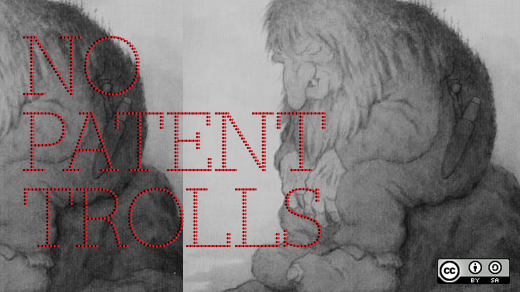At the Linux Foundation counsel meeting in Palo Alto last week, I had a chance to talk with attorneys for some leading tech companies about the threat to open source software from patent trolls. Some still politely avoid calling a troll a troll and substitute the more anodyne “non-practicing entity.” I find the uglier term more fitting, because it's an ugly business.
When I say troll, I'm talking about an entity that produces neither ideas nor products and exists for no purpose other than to extract the maximum possible amount from companies that produce actual goods and services. Yes, I know, it's legal. But a troll is unlike most businesses. Sure, all businesses try to maximize profits, but most businesses contribute something positive back to society. It may be an innovative product, or a not-so-innovative product. Some companies are more mission oriented, while others are mainly bottom-line oriented. Obviously, there's a wide range of legal business activities and styles.
But there's no ambiguity about the purpose of a troll. It exists purely to gain lucre. It does so by threatening operating businesses with patent lawsuits, which are often unpredictable as to outcome but always expensive. The going rate for defense of a patent case starts around $3 million. In many cases, companies find the expected cost of litigation less than the cost of paying off the troll. This is less physically hazardous for both parties than, say, the kidnapping business, but the two activities have in common a brutal amorality.
The trolls have a cover story: that they just want to help inventors. They try to exploit the appealing story line of the lone inventor fighting the big guys for a fair reward. But that story has little to do with the reality of innovation in software, which is hardly ever a product of lone geniuses. Rather, software innovation is generally recognized to be cumulative in nature, with each component resting on many earlier sub-components. Trolls don't care whether the patents they buy have anything to do with true innovation, and they don't care that their threats actually discourage innovation.
There is increasing recognition in the FOSS ecosystem that troll lawsuits are a serious problem for open source. This is an unfortunate but real indicator of the remarkable success of open source. As the profits and profiles of open source products have risen, even trolls have taken note. So much for the good news. The bad news is that trolls view open source like a Somali pirate views a container ship – that is, purely as a target. Troll lawsuits are at best a tax on collaborative innovation and at worst, for a particular target, an existential threat.
Is there a way out of this mess? Meaningful reform of the law of software patents may or may not be at hand, as we await the Supreme Court's decision in Bilski v. Kappos. Whatever the Supreme Court decides, there will probably be more work to be done. But for starters, let's call a spade a spade, and a troll a troll.







7 Comments